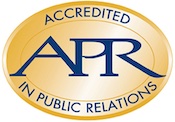Karen Brune Mathis, ex-biz editor, Florida Times-Union and now at the Daily Record of Jacksonville, has been asked to cover PRSA's boycott against the O'Dwyer Co. National chair Kathy Barbour is VP-communications at Acosta Sales and Marketing, Jacksonville.
Karen Brune Mathis, hailed as the "legendary business writer" of the T-U by Metro Jacksonville when she joined the Daily Record in 2010, is not to be confused with Karen Bennett Mathis, PR manager of Acosta, a mistake that was made in this space April 6. They are not related to each other.
 Karen Brune Mathis, Karen Bennett Mathis Karen Brune Mathis, Karen Bennett Mathis |
We had incorrectly concluded that the Karen Brune Mathis who wrote 2,580 words about Acosta for the Daily Record on July 23, 2012, was the same Karen Mathis who works for Acosta. That mistake was pointed out to us by Stephanie Cegielski, VP-PR of the PR Society.
The mistake served as an introduction to Karen Brune Mathis who spent nearly 30 years at T-U as business writer, columnist and then longtime business editor.
The Daily Record wrote about Brune Mathis in 2007 when she became executive director of Dreams Come True, a local non-profit that helps children with life-threatening diseases.
Mathis was not only a leading business editor, said the article, but a community leader who earned "numerous community awards" including those from the local Girl Scouts and Jacksonville Business and Professional Women's Club.
We hope Brune Mathis will explore the boycott of the PR Society vs. the O'Dwyer Co. since chair Barbour is now a local employee. That boycott includes blocking the O'Dwyer Co. from exhibiting at national conferences; refusing to allow O'Dwyer staffers as members although many other writers and reporters are members, and blocking Jack O'Dwyer from covering any national conference events since 2010.
"Slotting" of Products in Stores Is Questioned
The 2,580-word profile of Acosta CEO Robert Hill did not touch the issue of "slotting" of products on store shelves—companies paying for space on the shelves in cash and in supplies of the product.
A 2003 study by the Federal Trade Commission estimated that it would cost from $1.5 million to $2 million to introduce a new grocery product nationwide.
Margaret Webb Pressler wrote about the practice for the Jan. 20, 2004 Washington Post which gave it the headline, "Grocery stores demanding pay for shelf space; profit motive may overshadow customers' preferences."
Motley Fool said such fees appear to be "the norm" at many chains including Safeway and Kroger. Sheefood.com called the fee a "harsh reality" and "unconscionable levies" that the consumer often does not know about. Wikipedia said
"some companies" feel the fees are "unethical."
Virtually all stories that mention slotting fees and fees to keep product lines on store shelves note that it is a highly secretive activity that neither suppliers nor stores will talk about. It's said that such fees are kept "off the books."
Acosta Helps Products to Get on Shelves
Whether or not Acosta, a privately-held company, engages in slotting fees is not known. The article by Brune Mathis quotes Hill as saying that the company, which has "almost 30,000 employees" and revenues of $1.5 billion, has responsibility for making sure that client products are "found on store shelves" and are "appropriately priced."
Most of the company's "associates" are at the store level "day in an day out," he told Mathis, to "make sure the product is on the shelf, are in good condition, and properly rotated and that when we have display opportunities for our product they're out in the store as well." The Acosta website says it can "deliver faster speed-to-shelf for new items, correct out-of-stocks and voids more quickly, and gain greater distribution of existing products."
Does Consumer Come First?
The question raised by the Pressler of the Washington Post, Wikipedia and others is whether the practice of slotting serves the best interests of shoppers.
Shoppers, particularly those at a supermarket, assume that the products on the shelves are there because they represent the best value for the price and are not there because a supplier "bought" the space with cash and/or product.
Dean Rotbart, editor of The Journalist and Financial Reporting, noted in a talk to the 1993 conference of the PR Society that forces other than truth and facts influence what appears in the news columns.
He correctly pointed out that reporters have to worry about what the "inner councils" of the news media want and that may include building ad revenues. Rotbart gave several examples of advertising sections that are linked to editorial copy. The "inner councils," while not defined by Rotbart, obviously would include those from the business and editorial sides.
Media Reward Sources, Work with Advertisers
Reporters also tend to reward sources that give them news tips and one way they do that is by ignoring "minor negative news items," Rotbart pointed out.
The O'Dwyer Newsletter, covering the talk, noted that while Rotbart made many accurate points about the media, the Code of the Society specifically bars members from using anything but the story itself in trying to place something with the media.
The Society, after videotaping the Rotbart speech with two cameras and having obtained unlimited copyright to its use, then refused to make any copies available to anyone. It was to be a mainstay of its new video library. A multi-city tour by Rotbart of his "Newsroom Confidential" lecture series was cancelled.
Rotbart sued the O'Dwyer Co. for $21 million, charging malicious false coverage and an attempt to damage the business of a competitor. All charges were dismissed by a federal court, which called O'Dwyer "a good reporter."


 PRSA-NY today announced its five honorary co-chairs for its Big Apple Awards ceremony gala slated for TAO Downtown on Nov. 15.
PRSA-NY today announced its five honorary co-chairs for its Big Apple Awards ceremony gala slated for TAO Downtown on Nov. 15. PRSA-NY president Carmella Glover today issued a "heartfelt apology" on behalf of the chapter for her Oct. 14 message that "caused disappointment and hurt to some of our valued members."
PRSA-NY president Carmella Glover today issued a "heartfelt apology" on behalf of the chapter for her Oct. 14 message that "caused disappointment and hurt to some of our valued members." The leadership of Public Relations Society of America is backing a move to change the current “must-have” APR accreditation to “strongly preferred” as a requirement for a seat on its board of directors.
The leadership of Public Relations Society of America is backing a move to change the current “must-have” APR accreditation to “strongly preferred” as a requirement for a seat on its board of directors. Public Relations Society of American today named Linda Thomas Brooks CEO, succeeding CFO Phil Bonaventura, interim chief since July 2019.
Public Relations Society of American today named Linda Thomas Brooks CEO, succeeding CFO Phil Bonaventura, interim chief since July 2019.


 Have a comment? Send it to
Have a comment? Send it to 
No comments have been submitted for this story yet.